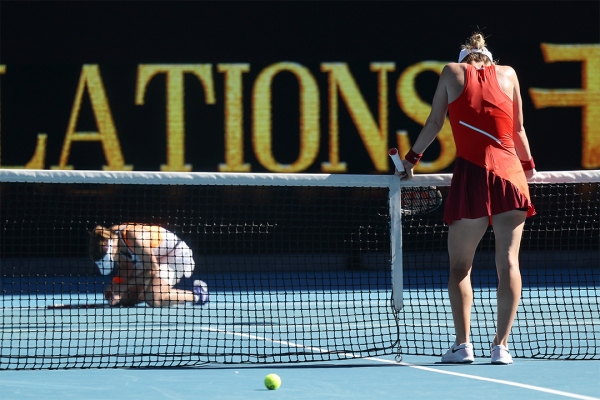Alize Cornet provided another example of her big-match instincts and Grand Slam experience to produce the shock of the 2022 women’s tournament at Wimbledon.
The veteran Frenchwoman, playing in her 62nd consecutive Grand Slam main draw, upset top-ranked Iga Swiatek on No.1 Court on Saturday – ending the Polish star’s incredible 37-match winning streak.
It set a fourth-round showdown with fellow unseeded player Ajla Tomljanovic, and Cornet will target a second Slam quarterfinal this season after reaching the same stage at AO 2022.
Before then, she had never appeared in the last eight of a major.
“Beating Iga today feels like a dream, really,” said the world No.37.
“It's a big pride for me to win this match. What she's done this year is out of this world, and I can't believe I'm the one that actually broke the streak.
“This is amazing.”
But perhaps Cornet should believe it, given her history at the All England Club.
In 2014, on the same court in the same round at Wimbledon, Cornet took on world No.1 Serena Williams, and stunned the American in three sets.
“It's crazy because it's almost the same scenario than eight years ago against Serena. I did it again,” Cornet said.
“It's a nice feeling to see that at 32 years old I'm still going strong like that.”
Cornet thriving at the majors
Indeed, Cornet is enjoying one of her finest seasons more than 15 years after turning pro, and 13 years on from her career-high ranking of No.11.
At Australian Open 2022 she enjoyed an emotional breakthrough, upsetting Simona Halep to reach a first major quarterfinal in her 63rd attempt.
HALEP HAILS CORNET: "I have only nice words"
By playing at SW19 she levelled Ai Sugiyama’s record of 62 consecutive Grand Slam main-draw appearances, a record she could take ownership of if she plays next month’s US Open.
Back in Australia in January Cornet was outside the top 60, but she has since almost halved her ranking and entered Wimbledon in form after a semifinal showing at the WTA Bad Homburg grass-court event.

And she was confident when coming up against the all-conquering Swiatek for the first time in her long and fruitful career.
“I had this belief for a few days already,” Cornet said after reaching the last 16 at Wimbledon for the second time.
“I was telling myself someone would have to break the streak eventually, and why not me? That's all.
“I thought that here was the best chance for me to do it. Maybe it was her less good surface.”
Swiatek’s struggles
Throughout the tournament Swiatek discussed feeling discomfort on grass, a surface impacting her natural movement patterns in a way both clay and hard court do not.
She overcame patches of error-strewn play to beat opponents both ranked outside the top 100 in her first two matches at the All England Club.
But against the higher-ranked, more-credentialled Cornet, she was exposed.
Swiatek sprayed shots repeatedly as she fell behind 3-0 and was a point away from trailing 4-0.
She briefly tightened up her ground game and earned a point to level scores at 3-3, but Cornet’s intensity and consistency asked questions of her she could not answer.
After losing the first set, Swiatek rallied again, going up 2-0 in the third set – only to lose the last six games of the match.
She shanked an overhead well long of the baseline in the seventh game and smiled wryly, before sending a forehand into the net on match point.
It was her 33rd unforced error of the day; Cornet finished with seven.
“What can I say? I mean, I know I didn't play good tennis. I was pretty confused about my tactics. As a solid player, she used that pretty well,” Swiatek said.
“(This season) I started being more and more aggressive. It was really comfortable for me to have the initiative and be proactive. But here I couldn't control the ball.
“Usually when I'm coming back (in a match), I have some kind of a plan and I know what to change. Here I didn't know what to change. I was confused.
“On grass court everything happens so quickly. I can't just use my topspin and put back these balls and just run the point and hope being solid, sometimes pushing the ball, is going to give the right effect.”
A sensational streak ends
Swiatek admitted that, judging by her subpar feelings in practice and before matches this fortnight at Wimbledon, she was aware her unbeaten streak could end.
“Maybe it's not the right attitude to have, but it is like it is,” she said.
This perhaps inevitable loss, then, ended one of the more magnificent winning runs in recent women’s tennis history.
Iga Swiatek's loss at Wimbledon to Alize Cornet was her first loss since February 16.
— SportsCenter (@SportsCenter) July 2, 2022
Her 37-match win streak tied for the third-longest win streak on both men's and women's tours since 1990. pic.twitter.com/8kDFAUBd7F
By winning her 36th consecutive match with her first-round victory over Jana Fett, she achieved the longest WTA winning streak this century.
Her 37th consecutive win, over Lesley Pattinama Kerkhove, made her streak the best in 25 years, equalling Martina Hingis’ stellar stretch in 1997.
AO FLASHBACK: Hingis 1997 title part of 37-match win streak
This was her first loss since February, when she fell to Jelena Ostapenko in the second round in Dubai.
Since then, she collected six consecutive tournament titles – including her second Grand Slam title at Roland Garros – and match wins on hard, clay and grass.
“I guess you have to ask me next month when I'm going to have time to reflect little bit,” she said, “but I hope this is going to be the thing that I'm going to be proud of.
“Right now even I am satisfied with this streak, so I'm happy that I was able to do that.”